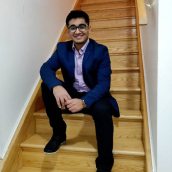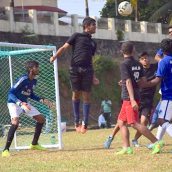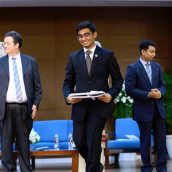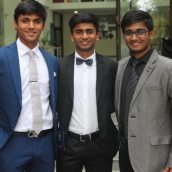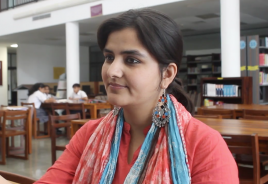Ariq Kapadia (Class of 2017): Using creative planning to make an impact
My time at the Aga Khan Academy Hyderabad has been a wonderful journey for me. I went through series of experiences that has made me what I am today. My friends, teachers and everyone around me had an integral part in shaping my life. I joined the Academy back in 2012 and the residence experience was completely new for me. I was frightened by the fact that now I must live away from my parents at such an early stage. This could typically be a nightmare for some students, but for me it was incredible – reflecting on my time there only makes me want to go back and relive my life at the Academy residences. Getting up for school, all the students racing for the washrooms only to win the chance to take the bath first. Planning out sports schedule in lunch breaks just to play a good soccer game after school. All this has been fun and amazing, and it has taught us students a way of life.
The Aga Khan Academy Hyderabad has been well known for years for their participation and success in soccer. Being an integral part of this team was a joyous and proud experience for me. I was selected for the team back in 2013 – at that time, our team had just started their dominance in the city while we were still preparing ourselves for other challenges at school. It was tough at first to balance sports and academics alongside other projects and activities; however, we slowly got acquainted with it. We used to plan out training times before and after school and commit ourselves to the sport. It helped me improve my punctuality and taught me a lot about time management. Soon after, I had the privilege of leading my U-16 team to the finals on home soil; unfortunately, we ended as runners-up, but the experience I gained while leading had brought some significant change in my behavior. I had grown a sense of responsibility and maturity – I had learned to be a leader. It did bring us trophies back to back for the next few years, but the true realisation for success came in 2016 when we got an opportunity to challenge teams at the national level. It was the first time a squad of eight students were sent for the TAISI tournament to represent the Academy. It was foremost the proudest moment of my life, standing alongside my teammates, ready to take up some of the best teams in India. Successfully, we won the tournament and brought the trophy back home, the first-ever away trophy that the Aga Khan Academy Hyderabad has ever won. Achieving such feat has been overwhelming, but the values I have learned in this experience will remain within me and will shape my future.
Along with sports, I completed various projects at the Academy. As part of our IB [International Baccalaureate] requirement, we had to complete personal projects and Extended Essays in order to pursue our interest in researching about various things through variety of subjects under experienced supervision. Not only did these projects let us gain experience in detailed researching, but it also helped create awareness in specific regions. These projects were bounded with criteria, ranging from personal interest to benefits in society and impact on environment. It made us think about the different aspects and potential effects of our projects, and in turn adopt a broader approach to our research. My project was about city planning and making solar energy the primary source of energy. I aimed to create a small model that gives a better representation of my idea about proper city planning. It was my first time working with wires and solar cells. I had to learn to make a solar plant model and integrate it in the main model. It really was great fun, and I learned the importance of city planning to reduce space wastage and save energy by using alternate renewable sources of energy. My Extended Essay was based on my favorite topic: healthy food. I conducted chemical experiments on food to check the alteration of protein content in food when cooked or uncooked and when hot or cold. My aim was to understand the effect of temperature on food. It went well and it answered some questions I personally had as well. I used dangerous chemicals and chemical equipment throughout my Extended Essay. I improved my personal skills in areas such as communications and built confidence in my ability to work individually. I learned more about society and gained a variety of knowledge on environment preservation.
During my time at the Academy, I have developed skills and values from certain experiences, but it was my participation in Model United Nations (MUN) that had a significant effect on me. I started participating in MUN to enhance my verbal skills and improve my knowledge about events happening around me. Over a period, I swiftly transited to the logistics group. I realized that my ability to manage and plan were beneficial to these events. I was given a chance to assist the Under-Secretary-General of Logistics and soon after I claimed the title for myself. Through this experience, I improved my management skills, developed various approach to different problems and mastered problem-solving skills as a result. I was given the opportunity to lead the Academy’s first ever METROMUN Conference, which allowed students from various schools to participate. The challenge of managing other students was very beneficial to me as it has boosted my confidence in my management skills. Once I had experienced managing MUN, I sought more knowledge and experience in this area – this helped me get into a co-op programme where I am currently working on certain projects and managing project teams to get the best results.
Over the period of time I spent at the Academy, I applied a common skill to all the initiatives in which I took part: strategic planning and creativity. Whether it was sports, projects or MUN, I was fond of innovation and had always been busy with creating something with whatever I had around me. When we plan our strategies for a soccer game, I loved coming up with interesting formations which sometimes didn’t make much sense. I would never give up trying to find a better one, sometimes I would modify the existing one or would come up with something new. Similarly, in MUN, I would plan to change the setting or come up with a different style of conducting the conference. I always looked for alternatives for the existing ideas to make them better or search for a new one to improve efficiency. All these made me realise that engineering is what suits me well and my interest in aerospace and machines brought me to continue my studies in Mechatronics Engineering at the University of Waterloo. Henceforth, with such knowledge, I can pursue my dream of developing my home town and making India prosperous in terms of knowledge and technology and to help His Highness achieve his vision of eliminating poverty.
All this knowledge and these experiences have helped me get into the University of Waterloo. Studying at my dream university is a direct result of what I have accomplished through hard work, determination and focus. My friends and teachers at the Academy supported me throughout, and all the memories I have from there still teach me various things in life. The experience that I had in those five years at the Academy continues to develop me further and make me more capable of success. In my engagement with activities at the university, I have found that all the skills I learned at the Academy have prepared me to face the upcoming challenges.
When I look back to five years ago, I see a small kid, terrified and trying to surpass the ranks. However, now five years later, even though I am still trying to achieve my goals, I feel ambitious and determined, not scared but instead craving to prove myself. I have had a lot from the Academy and now I feel it is my time to give back to society to make this world a better place to live in.
By Ariq Kapadia
Maryam: Becoming a better teacher
The Teacher Preparation Programme (TPP) is one of the Aga Khan Academies’ landmark teacher development initiatives. In this interview with Kamini Menon at the Aga Khan Academy Hyderabad, TPP participant Maryam talks about the TPP’s unique aspects and her experience with the programme.
Please tell us a little bit about your background.
I’m a part of the Teacher Preparation Programme in Hyderabad. This is my fifth year in teaching, and previously I worked for a Teach for India school in Delhi teaching 48 amazing girls. When my fellowship with Teach for India was over, I applied to the Academy, and here I am.
What made you join the Academy and inspired you to come here?
My previous experience as a Teach for India Fellow made me feel like I wanted to something more than just being a teacher. So I was looking for an option post-fellowship that shared a similar mindset or similar values. When I read about the Academies, the vision really interested me as well as the whole inclusive policy: giving a chance to anyone coming from any background and making sure that we provide them this idea of excellence in education. That was something that really inspired me, and so I joined the Academy.
Talk about the Teacher Preparation Programme (TPP) and where you are in that journey.
The Teacher Preparation Programme is the initiative of the Academies to make sure that we have home-grown teachers who become IB educators. This is a great initiative. This is my ninth month into the programme, and I teach in a classroom, I research, and do a lot of things at the same time. I am getting mentored by experts and improving my pedagogy every day.
Can you explain the structure of TPP? How it is organised and what does it involve?
The programme is an intense 18-month long process, and you do things in phases. In Phase One, we were in a classroom, paired with a mentor, teaching 20% of the time. Now, we are in Phase Two, and I have to teach 50% of my time in a classroom. But it’s not just the teaching. We also have to write an action research paper, which is crucial to the whole programme. Another thing which is important is the Problem-Based Learning Sessions, which are a great way to reflect on who you are as a person, not just as a teacher. In these sessions, we meet three times in a week, and we bring together all our research findings and what we have collected, and we progress to the next learning target. We work on this in groups, and then we get to reflect and apply that in a classroom at the same time.
Can you share two aspects of the programme that you find particularly unique or helpful?
For me, the most interesting part was problem-based learning. It takes a lot of patience to think in a broader way about a problem. The problem sets are given to us – then you create your learning targets, and the whole group researches with different objectives. That makes you really responsible, that improves your research skills. At the same time, it teaches you how to collaborate with members of the group. Another part that I find really interesting and at the same time challenging is my action research piece. It’s not just research; the action part is the most challenging part because you have to reflect on your own practice. For example, I am doing something on inquiry right now, but it’s not just inquiry – it’s “why inquiry in an IB classroom?” or “why even think of those big theories?” So, this has made me more reflective, it has made me more thorough with my work. At the same time, if and when I fail, it’s alright to seek advice and it’s alright to go back to my mentor to ask why this did not work in a classroom. Both problem-based research and the action research, I find that these are pushing me to become a better teacher.
How would you evaluate the model of mentorship that’s in place within the TPP?
Sandra is our mentor, and she is a really experienced Ontario teacher. She has streamlined the programme, she gave it more structure and depth. When you work with Sandra, you are not intimidated by her. You are working with an expert who knows so much, but at the same time she gives you a chance to really apply yourself. She is a mentor for me when I am doing anything in the classroom – she is always providing me with constant feedback on my pedagogy and on my action research paper. Even in the intense Problem-Based Learning Sessions, where it gets a little crazy at times, Sandra is always there to nudge you in the right direction so you come to a conclusion.
How do you and your colleagues in the TPP work together and collaborate?
We are a very diverse group. Sitting with all of them has made me a better teacher in so many ways. It is not easy to admit sometimes that you don’t know things, but I get to learn from these people because their experience, our discussions, and the help we give each other is really great. We also collaborate outside the classroom – for example, if I have a doubt or find something challenging, I go to one of these colleagues and ask for their help. They are always there for me. We really push each other to reflect, to ask the right questions, which makes you think.
Can you talk more about the process of reflection that you have in your TPP group?
For us, reflection is about making yourself vulnerable in front of the whole group. It is not easy – it is not at all easy. We don’t reflect on a superficial level; we have to really apply ourselves in the entire process. When create our reflections, we have to share them with the whole group – and the group knows and understands who you are and gives you feedback. They push you to think along certain lines, and our mentors force us to think about the way we think – it becomes more about metacognition. The whole idea of learning from someone is that you have to be vulnerable and sometimes even fail, and then admit that you failed. When you draft that experience into a reflection, it makes you a better teacher. And definitely a better person.
How do you think the TPP has made you a better person in actual fact?
The way the TPP is designed, you become a reflective practitioner – that’s the goal! You teach in a classroom and you know that it’s not just a physical space, it’s much more than that. You cannot teach in isolation – you have to collaborate with other people, you have to go and ask for help. At the culmination, you really will become a better teacher. It’s a rigorous process, it’s an intense process, it’s a very reflective process. But the goal is that, ultimately, you will be the kind of teacher you want to be as well as an effective teacher.
Can you give us an example of how you’ve applied something you’ve learnt through the TPP in a classroom setting?
Right now, I am doing an action research, and a huge chunk of this is based on inquiry-based learning in a classroom. I’m teaching grade 6, and the unit I was dealing with was “did they live like us?” It is a lot about civilisations and the way people lived and interacted with their environment. All the research that I did during the Problem-Based Learning Sessions and my action research, I applied it in this classroom setting. I created the lesson plan and then got the feedback from my mentors. Then it gave me a chance to reflect on my practice: sometimes I tend to go a little overboard, and I got to see if my plan would work out. This is how you become a better teacher.
Is there anything else that you’d like to add about the TPP?
I’ll say, for the whole process, you have to be very open. You have to be open-minded to get into this process. It’s not easy just to acknowledge that you’re going though 18 months of training – you might feel intimated, or that your prior experience doesn’t matter. But that’s not the point. The point is to become a better teacher. If that is your goal, then this programme will work for you. The way this programme is designed is rigorous and beautiful. The most important point depends on you: what do you want to take away from this. And there is a lot, if you are really open to exploring.
Sujana Veeramachaneni: Teacher, Assistant Coordinator, Dorm Parent, Mentor
At the Aga Khan Academy Hyderabad, Sujana Veeramachaneni holds more than her official titles of biology teacher and Assistant Coordinator for the Diploma Programme (DP), science teacher for the Middle Years Programme, and dorm parent. Sujana also ensures her students see her as a friend, mentor and pillar of support.
“They should always feel that I’m there for them, no matter the situation, or condition or time of day,” she insists. “Sometimes I get midnight phone calls! They don’t hesitate to approach me.”
Since the majority of DP students live on campus, “My job doesn’t end in the school,” she explains. “We see them as students, and the dorm is like a home for them – so it’s like seeing them at school and at home – same child, different behaviour. Sometimes it’s difficult to draw a line, because we see them here as well as in the school – so that emotional role is with us, also."
“Of course, I have to draw the line – otherwise maintaining discipline is quite difficult – but at the same time, that line is flexible. It’s not firm – but of course, there is a thin line.”
From her side, Sujana believes that she and other staff can learn from the students’ impressive ability to control their emotions at school. “These are all teenagers,” she reflects. “We see them here, inside and outside. Sometimes, even we lose control – but the students don’t have tantrums in front of their teachers. That’s what I learn from them – how to control our emotions.”
Sujana remembers what she went through at her students’ ages, and understands the pressures they face, especially those approaching graduation from the Diploma Programme, who face multiple deadlines, university applications, and academic and personal challenges. “I always put myself in their shoes,” she emphasises, and shares with her students her anecdotes on how she dealt with stress as a student.
At the same time, she acknowledges times have changed. “This generation is under more pressure – we were not exposed to so many kinds of media or diversions. They are dealing with many things at the same time – compared to them, when we were students, we had less complexity in our lives.”
The demanding IB curriculum motivates Sujana as a teacher, even though her switch to a career in teaching was first supposed to be temporary. Sujana holds an MSc in life sciences, with a specialisation in endocrinology, and a PhD in plant physiology. Her research focused on the physio-biochemical parameters of the post-harvest life of roses, after which she worked in post-harvest floriculture in Bangalore. In 2002 she relocated to Hyderabad and started working as a teacher in an international school.
She was drawn to the demanding and challenging nature of the International Baccalaureate curriculum and in 2013 joined the Aga Khan Academy as a biology teacher. Her career at the Academy has been a learning trajectory: “I’m definitely enjoying the professional development here.” She highlights the different positions she has held over the years, as well as gaining confidence over the years in teaching, helping, and guiding Special Education Needs (SEN) students, and the training, support and resources she has received from the SEN specialist at the Academy.
She also appreciates that the Academy itself is always developing – every year different projects, opportunities and ideas are introduced or planned for the future, and she praises the community service that the school ensures students experience: “It is inculcated in the students – the mission itself is very good and strong.”
The Academy is also always learning from its students; if, for example, some students stand out at drawing or music, the staff will learn from those strengths, and apply what they learn with students in the next batch. The curriculum is reviewed every year, and coordinators and deans take sessions every year to improve and upgrade their skills.
Academically, Sujana especially appreciates the opportunities students have to explore their own interests and to learn independently – “That is the beauty of the Extended Essay.”
“It’s very dynamic,” she explains, and she describes the Extended Essay as a “piece of research work, where the student will find their passion” and submit an essay akin to a mini-thesis.
Because “the curriculum has the scope to identify the strength of the student in different ways” and “the student will design their own labs,” independence and the opportunity to follow one’s own interests is important: “Every student’s choice is different,” she says.
As their teacher, Sujana enjoys the intricacies of guiding the students individually and tailoring her teaching style to their interests and strengths. This year, she is supervising six students, whose self-selected Extended Essay projects explore a range of topics including hydroponics, the greenhouse effect and carbon dioxide concentrations, mushroom cultivation, seed germination, and the effect of music on the growth of plants.
Sujana enjoys being able to show her dynamic, expressive side at the Academy and the freedom of teaching styles and resources that is not always available at other schools. But she finds even more satisfaction in mentoring than in teaching, and it is most rewarding when her students achieve their goals – obtain university admission, get their diploma, or overcome an obstacle when they thought they couldn’t cope, but were “able to achieve something with our guidance.”
She emphasises the need to be adaptable and compassionate towards her students, both for academic and emotional support. “You have to tailor yourself to the needs of the students because some students, you really have to encourage them, motivate them, and some students – at times you have to be firm, strict,” she explains. “I change myself, as per their needs.”
When asked what she envisions for her students’ futures, Sujana replies that she wants them to identify their passions and to continue doing what they like. “I want them always to be confident.
By Natasha Pirani
